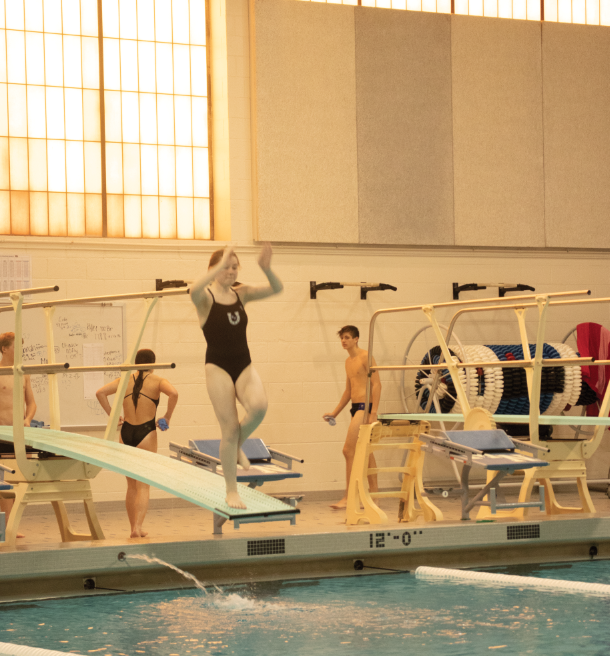Mind over dive
Senior divers overcome mental challenge of sport
Pointed toes, straight legs and a clean entry that just slips through the water, but the most essential part to any dive isn’t found after jumping off the diving board rather it is all decided by the approach.
The approach is where the last seconds of thinking are and where muscle memory will kick in. It is in the approach that the biggest challenge is met: the mental challenge, an obstacle that senior diver Rachel Folts is well aware of.
“Diving is very mental and if you get over [the mental challenge] it’s a big deal,” Folts said. “My sophomore year I was trying to get a dive that I had been working on for a long time and something I remember my coach told me is ‘you have to be dumb sometimes and not think about it.’”
The mental game that Folts faces when diving is an aspect of diving that everyone has to face, but in order to dive their best every diver has to win the mental game. For senior diver Jacob Henrich focusing only on the task at hand is vital to the dive’s execution.
“You have to have no other thoughts besides what your next physical move will be after your feet leave that board,” Henrich said. “like whether your arms are going forwards or backwards, and how long you’re going to stay in a tuck until you kick out. If you have any other thoughts, they’ll probably be on what could go wrong, and that will mess you up.”
For each diver they use their own techniques to mentally prepare and accomplish a dive, but one technique that head dive coach Jeffrey Brady stresses is visualizing a dive.
“The only thing I tell the divers is to visualize and anticipate every individual movement within the dive; starting with the approach into the take offs, to what’s happening in the air, through the entry,” Brady said.
There is another level of difficulty added to the mental challenge when they are learning how to execute a new dive. Learning a new dive requires a balance of both not thinking and actively thinking to try to build muscle memory.
“The best way to get over a mental block is to practice [the dive] in repetition, so your brain acknowledges that it’s possible to do there isn’t anything scary about the dive,” Folts said.
Building up muscle memory is different for everyone and sometimes the dive can be mastered in a single practice and for others it can take a week to perfect a dive.
“You may fail for an entire day, that’s just a fact, but after that, thinking about the dive, imagining how it would look, how it would feel to go throw each step of it, helps you get a sense of it and makes you more comfortable with it,” Henrich said.
No matter how long it takes to master a dive feeling that comes with a perfect execution makes it worth it for the divers.
“After I hit the water, I think about how well the dive was based on how it felt. I can feel if I enter the water wrong, if something in the flip or anything was wrong, so as soon as I hit the water I think about if it was an okay dive or not. If it was a good dive, I’m already smiling by the time my head pops out of the water,” Henrich said.


